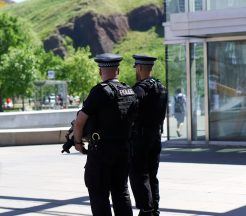Shop sales remained at pre-pandemic levels last month as retailers continue to face “no shortage of storm clouds”, according to a new report.
While food and drink continued to perform well, fashion and footwear trade in Scotland was “sluggish”, highlighting the polarisation between food and non-food sales.
The Scottish Retail Consortium (SRC)-KPMG Scottish Retail Sales Monitor showed that, between January 30 and February 26, total sales were 6.3% down on February 2020, when they had decreased by 0.8%, though this was above both the three-month and 12-month average falls of 9.4%.
The monitor provided comparisons with February 2020 as last February Scottish retail was in lockdown, pushing many consumers to buy goods online.
Total food sales rose by 3.5% compared with February 2020, when they had increased by 2.9%.
However total non-food sales fell by 14.5% in February compared with the same period two years ago, when they had dropped by 3.8%.
SRC director David Lonsdale said: “February saw a further incremental improvement in Scottish retail sales, helped in part by purchases associated with St Valentine’s Day and a slight uptick in people returning to workplaces. However, retail sales still lag behind the comparable period prior to the pandemic, underlining the prolonged nature of the retail recovery.
“The polarisation between food and non-food continues. Food and drink sales continued to perform well, albeit buoyed somewhat by food price inflation. Retailers reported that larger furniture items sold well, often due to deals on interest-free finance.
“Beauty products and office-wear sales got a lift as more people started to return to the office. However, fashion and footwear as a whole was sluggish, held back by continuing challenges with securing timely supplies of stock from abroad which affected seasonal ranges.
“There is no shortage of storm clouds facing the industry at the moment and the outlook remains uncertain. Retailers continue to face difficult trading conditions due to supply chain challenges and weak demand, with rising inflation across the economy likely to crimp consumers’ spirits and their propensity to spend.”
Lonsdale said this is set to be compounded by rising public policy costs over the coming weeks, notably the reinstatement of business rates and the hike in employers’ National Insurance contributions from the start of April.
The monitor showed that the 14.5% fall in non-food sales was above the three-month average decrease of 20.4% and the 12-month average drop of 20.7%.
Adjusted for the estimated effect of online sales, total non-food sales were down 34.1% in February compared with February 2020, when they had fallen by 2.4%.
This was above the three-month average decline of 34.8% and below the 12-month average decrease of 22.9%.
Paul Martin, UK head of retail at KPMG, said: “Scottish retail sales remained sluggish in February, remaining still some way off pre-pandemic levels of spending.
“A double whammy of rising inflation and supply chain issues continues to impact both shoppers and retailers alike, with many consumers choosing to cut spending in order to manage increasing household bills.
“Scottish retailers also face tough inflationary pressures and will have to make challenging decisions around how to manage supply chains, absorb higher costs, or pass them on without losing custom.”
Follow STV News on WhatsApp
Scan the QR code on your mobile device for all the latest news from around the country


 iStock
iStock

























